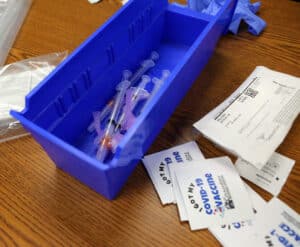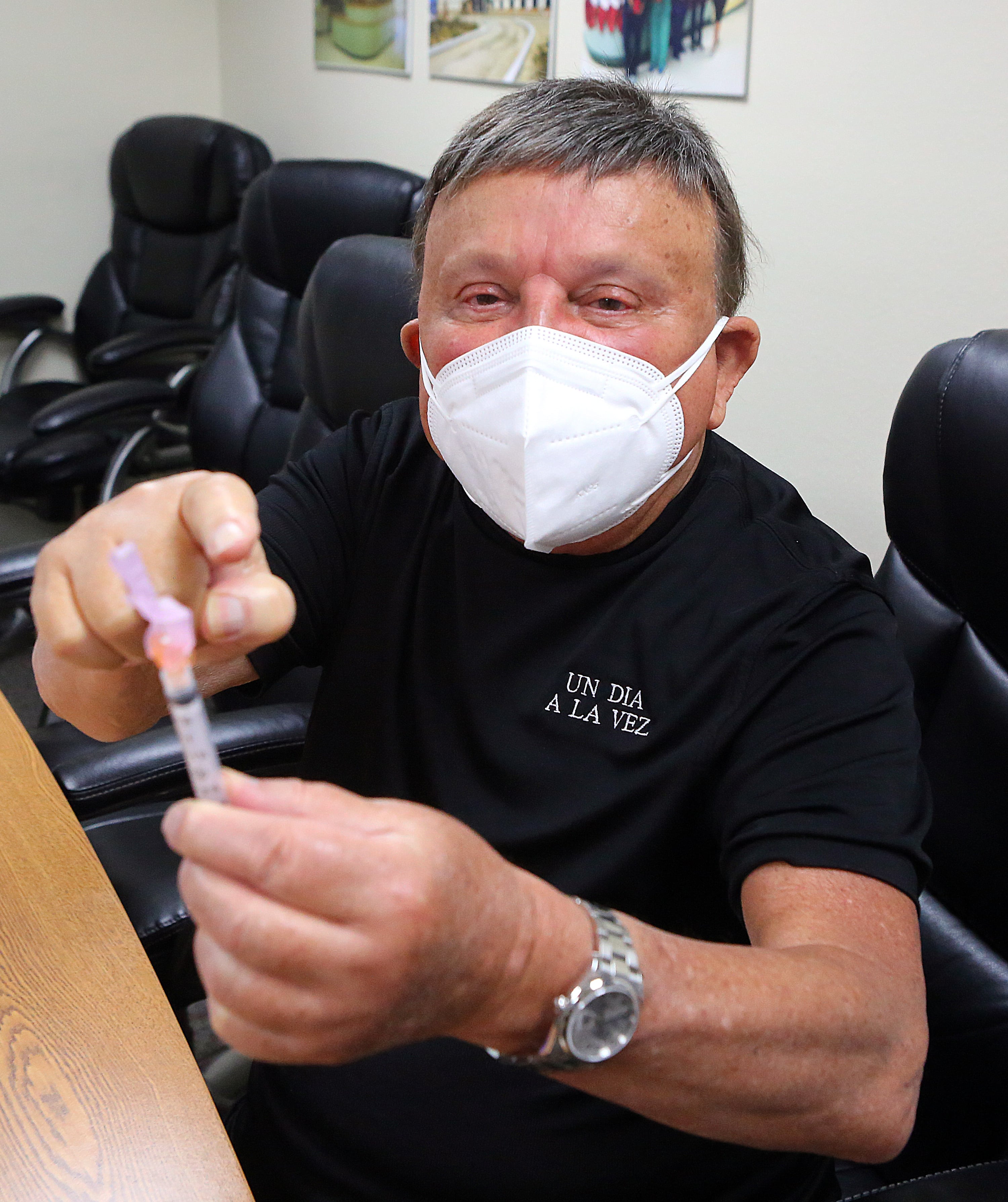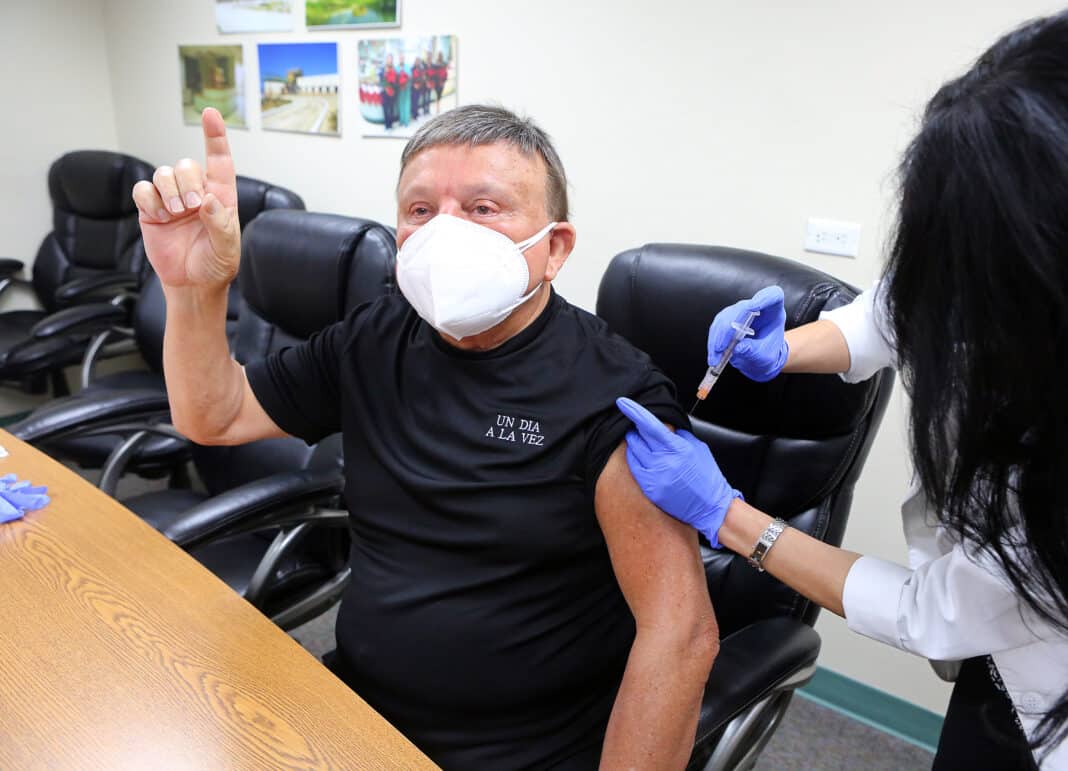
EDINBURG — Monsignor Juan Nicolau went to Cornerstone Regional Hospital in Edinburg on Thursday, bared his arm and did something he swore for months that he wouldn’t do: he got the COVID-19 vaccine.
He’s glad he did, but he regrets the two months he spent saying he wouldn’t.
There are many Rio Grande Valley residents who stand in the way of a monumental effort by local health authorities to vaccinate at least four-fifths of the population against the coronavirus, and Nicolau was one of them.
These individuals oppose the vaccine for a host of reasons, including genuine anxiety over it, a lack of understanding of the medicine behind the drugs and belief in wild conspiracy theories.
Frustration with the rollout process — bitter anger, really — is what originally turned Nicolau against inoculation.
The monsignor tried to sign up for the vaccine early in the rollout. An 83-year-old diabetic who’s survived cancer, Nicolau certainly qualifies according to the tier groups the state has detailed as among those receiving the vaccine first.
The call to get vaccinated never came. Nicolau felt cheated. He couldn’t get a vaccine and neither could elderly members of his flock. He felt like the process was unfair and biased toward people with connections.
“Then I got mad, and I decided not to get the vaccine,” Nicolau said. “So I put it on my Facebook, my page, and then 60,000 people saw it on Instagram.”
When Nicolau did that, he sent a ripple of doubt through the Catholics he has influence over.
Doubt in the vaccine is nothing new. UTRGV School of Medicine Dean Dr. John Krouse says the university found less than 50% of people was willing to get vaccinated when their rollout began about six weeks ago.
“There are lots of reasons that people are hesitant to take the vaccine,” he said. “So what we need to do, and what we are doing is providing education — what’s the science, what’s true and real around the science of the vaccine. How does it work, what will it do, what won’t it do. I think the science is a big part of it.”
That science, Krouse said, includes the fact that the vaccine is overwhelmingly safe and almost never results in significant side-effects. He says it was researched ethically and that he hasn’t seen systemic inequity in the rollout process, which was Nicolau’s concern over the vaccine.
“Everyone is working as hard as they can. It’s not that anyone is trying to put the brakes on this process,” Krouse said. “It’s a legitimate supply issue, there’s a huge demand, and really at this point no one can keep up with the demand. That’ll change in the next month or two.”
Krouse is hoping when supply can meet demand, the demand will stay high. To achieve that, the university’s public relations campaign for the vaccine relies on email blasts and website updates and frequent social media posts, usually trying to reinforce how a person will benefit from the vaccine rather than how they could suffer without it.
“If you get the vaccine, you’re going to be able to spend Thanksgiving with your family again,” Krouse said. “You’re going to be able to have weddings that the family can come to again. You’re going to be able to feel comfortable traveling again.”
Community influencers — people like Nicolau — are important in transmitting that message too, Krouse said.
“We’re using people in various social groups as influencers,” he said. “Faculty members, students, minority populations. I think if people see that they have individuals in the same peer group, in the same social groups, that are comfortable and come out and say, ‘I’m doing this, it’s important,’ that helps. So we really started to rollout an influencer campaign around the first of the year.”
The message appears to be getting across. Krouse says willingness to take the shot has crept up from below 50% to somewhere between 60% and 70%.
It’s still not at the ideal level — Krouse says he expects an 80% vaccination rate will achieve herd immunity for the Valley by the end of 2021 — but it’s moving in the right direction.
“It’s gone up,” Krouse said. “Part of that is education, part of it is just time. You know, if you’re the first one to get it, how do you know what the side-effects are going to be? But now if your friends have gotten it, your colleagues have gotten it, they do well and they’re feeling well, then you’re going to be more likely to get it.”
It took a stern conversation with his doctors to convince Nicolau to go in for the shot. They didn’t tell him he should take the vaccine; they told him he must take the vaccine.

“I trust my doctors,” Nicolau said. “There are two things I trust: faith and medications. God is gonna help, God is gonna listen, God is gonna heal you — but it’s not enough. God gave me medication, the right medication and the right doctors, and that’s how he’s working.”
Nicolau’s appointment went off without a hitch. He didn’t feel a thing. He said he wasn’t even sore afterward. He blessed the medical staff and the woman who injected him, a woman he’s thoroughly charmed with and very much looking forward to seeing again in a few weeks.
The next day Nicolau was still feeling well. He performed two funerals — he’s had to do lots of funerals lately. One of the deceased died of COVID-19.
The only side-effects Nicolau felt were emotional: guilt over originally advocating against the vaccine and a lingering feeling of frustration with those throngs of people lined up to get it.
“On one hand, I feel very happy,” he said. “On the other hand, I feel unhappy to see so many people that do not have the chance to receive the vaccine.”
As a way to atone for his original opposition to the shot, Nicolau has performed an about-face and become one of those community influencers Krouse says will be important in reaching herd immunity.
Now, Nicolau’s using his pulpit to urge people to talk to their doctors about getting the vaccine and to get the shot if they OK it.
“It’s a must,” the monsignor said. “They must have it.”





